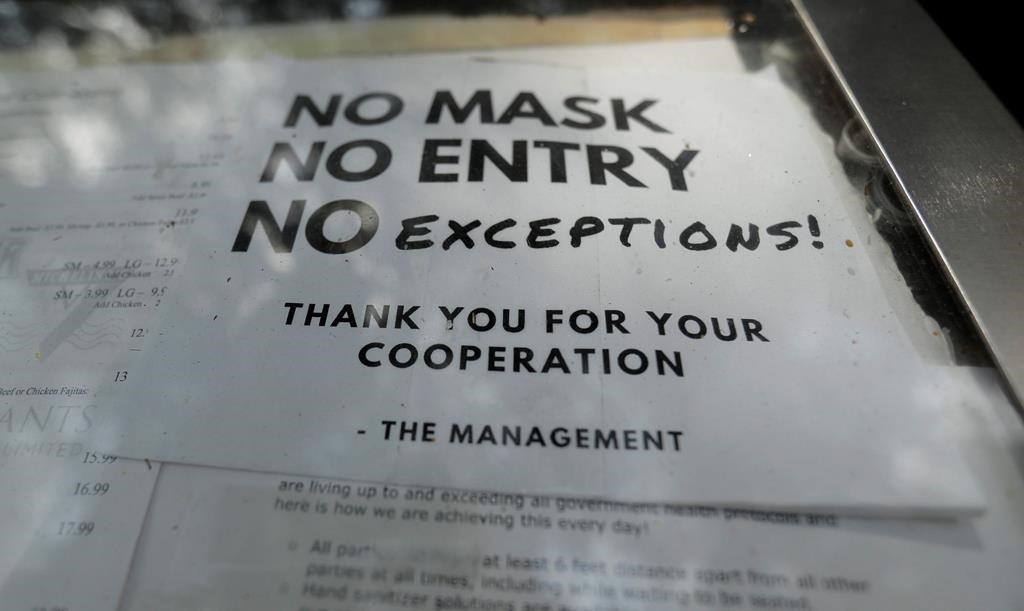CORRECTION: An early version of this story said the maximum fine for individuals could rise to $75,000 when the actual increase is to $7,500. Global News apologizes for the error.

Fines for non-compliance with emergency orders in Saskatchewan are going up — substantially.
Legislation introduced Thursday will have fines for an individual not complying with an emergency order increasing to a maximum of $7,500. The current maximum is $2,000.
For corporations, the maximum fine will increase to $100,000 from the current $10,000.
Saskatchewan justice officials said the “more significant fines will act as a deterrent and penalty for those who carry out more serious offences.”
The new fine amounts are consistent with those found in the Public Health Act for beaching public health orders, they added.
Justice Minister and Attorney General Gordon Wyant said the amendments are, in part, a response to the current COVID-19 pandemic.
“The time for education is over,” Wyant said.
“We need to be very aggressive in terms of ensuring that there is compliance with public health orders.”
It will be spring, at the earliest, before legislation passes, and Opposition Leader Ryan Meili questioned why the bill wasn’t tabled sooner.
“It’s a strange thing to say that somehow these changes to the act that won’t take place until the spring are a response to what we’re dealing with COVID-19 today. If that’s a COVID-19 measure, it’s about as useful as me wearing my mask under my chin,” Meili said.

Get daily National news
“If more serious fines are required, why did the government not take advantage of the fact that we were here and perfectly willing to be part of that discussion and pass legislation during this session?”
Wyant said consultations on various provisions in the bill are ongoing.
“Given the timing, a short session, we didn’t have the opportunity to have the full amount of consultation that we want to have with people that will be affected by this,” he said.
“And so those consultations will now occur and we’ll bring the formal bill forward to the house in the spring.”
Meili called that “irresponsible” and said the NDP is ready to work with the government to pass legislation.
“I think they should have acted a month ago when they knew it was really going on,” he said.
“They’ve been completely irresponsible in not acting sooner and taking this more seriously.”
Police will continue to issue tickets for most minor infractions, and Wyant said the legislation sets out how police go about enforcing orders.”
“We know that the police have been issuing fines with respect to breaches under the public health orders,” he said.
“We wanted to clarify that.”
Meili said he hopes police enforce public health orders at rallies he said are taking place this weekend.
“I would encourage law enforcement to send a clear message that people shouldn’t go to that rally and that they will face fines,” he said.
“I think the people who are leading these rallies are being completely irresponsible and they’re sending a terrible message. And the government, by soft-peddling and not taking them seriously and not imposing fines, are sending that message.”
On Monday, Saskatchewan Premier Scott Moe called for an end to the rallies protesting public health orders.
“We expect the law enforcement officials to use their judgement on when they do and don’t apply the enforcement of the laws that are in place. And the laws are in place and can be enforced by any law enforcement official,” he said.
Justice officials said the Emergency Planning Act did not contemplate an ongoing emergency of the magnitude of the coronavirus pandemic, highlighting the need for updated legislation.
The new legislation also confirms and clarifies protections for individuals and corporations from litigation based on COVID-19 transmission if there has been good-faith compliance with emergency orders and other applicable laws.
Similar laws been passed recently in Ontario and British Columbia.








Comments
Want to discuss? Please read our Commenting Policy first.